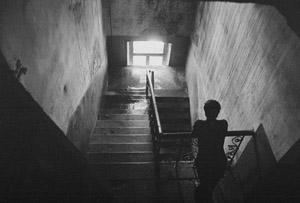On symptoms of prohibitive society
Nelia VAKHOVSKA: “When people lose hope, it is replaced by pornography in the way of narrowness”
Ukrainian literary magazine Prostory (Spaces) has been on the information market since 2008. However, not always is there a possibility to print the periodical. For example, only the fifth issue of Prostory has recently gone off prints. And for the most part it exists as an online magazine.
But the editorial board headed by Kateryna Mishchenko, Nelia Vakhovska, and Natalia Chermalykh does not lose heart and continues to publish the works of modern Ukrainian and foreign literature and essays, touch the problems of artistic translation, and discuss the questions of literature in the broad cultural and social contexts. Prostory is trying to create an autonomous platform for the artistic, social, and political criticism.
Taking advantage of the new issue’s launch, The Day asked the editors of Prostory what is their vision of the future of Ukrainian literature and the future of the magazine in this context. Nelia VAKHOVSKA gave an optimistic reply:
“I don’t think that Ukrainian literature of today is an example of decay. Some of our authors are still on the rise, but there are hopes that this is a start of a long way. Ukrainian writers of the 1990s used as the base the powerful works of literature, though they belonged to the Soviet time. But namely at the turn of the century we experienced a kind of literary break, it was not the literature based on the old tradition, rather an exploration of new things. As for me, the writers of the 2000s started to write in a kind of a vacuum surrounding, without holding to any groundwork which is only being created. Therefore the modern Ukrainian literature is only a start. Surely, there are fears where this literature might go. But the hope for the better persists.”
If the groundwork of Ukrainian literature is only taking shape, what is the role of classics in this process?
“Everything depends on what one considers classics. If we speak about the 20th century (modernism, avant-gardism) it certainly echoes in the modern literature. But the 19th century is so far considered absolute classics in Ukrainian literature, in the form of school platitudes which is hardly productive – only for conservative-minded authors who stick to the chimera of traditional values. Today it is hard to define any clear trends – everything depends on the author’s likings. Indisputably, there is no clean vacuum, the literary traditions are passed in one way or another, but in case with the Ukrainian culture they are not running through all. I don’t think that connection to classical works does not guarantee good writing, because everything depends on the quality of the dialogue with the classic, i.e., the skill of the modern author to think independently. But sometimes I feel scared by the feelings that young authors bend under the modern foreign traditions, importing themes and styles. I would really like Ukrainian avant-garde to be represented in modern literature in a more dialogical way. For in a sense the entire Ukrainian avant-garde literature during the 20th century was censured and the works have been preserved frequently in a castrated way. Vira Aheieva is now following this way: she is trying to reread Tychyna, Rylsky, and Sosiura in a new way and bring them out of the social realism popular literature, but whether our authors will heed to our literature expert still remains a question for me.”
As is known the publishing process of the fifth issue of your magazine has been slowed down by lack of funding. But this cannot be the only problem.
“Yes, on the one hand, there is a problem with funding. On the other hand, we exist in the situation of not so vast Ukrainian literary and intellectual resources, which would work in the field of art and were social-critical. In my opinion, the greatest problem of Ukrainian literature on the whole is lack of the readers. The society is forgetting the habit of reading. This complicates the life of books and practically makes it impossible for the magazine to live.
“Anyway, we are not going to stop our work. Our editors have refused from thin magazines published frequently. Instead we decided to publish 150-to-200-page magazines approximately twice a year. I would like them to be a complete set of texts, with which one could work for a long while. Our next issue is dedicated to the problems of poverty.”
The motto of the new issue of Prostory is “faith, porno, and love.” This is a rephrased triunity of “faith, hope, and love.” Why do you interpret the Christian phrase in such a way?
“There is a widespread opinion in the society that pornographic production cannot exist in our world. Yet the video production of this kind is widely spread. So it turns out that in the society which harshly censures some manifestations of human nature such trade as pornography is possible. Forbidden things are more attractive and popular. Pornography is a kind of writing and life, where everything is offered for the consumer in a simple and mechanic way, so to say on a plate. We are against such kind of existence. In our interpretation pornography is not about exclusively sexual or erotic content. Vice versa, it is a social phenomenon, a symptom of the prohibitive society. Replacing hope by porno we did not want to start a dialogue with Christianity (although a discussion on philosophy and revolutionary nature of early Christianity compared to its further institutional implementation would be no doubt interesting), rather we were trying to draw the attention of people to the system of restrictions and censure, which make it possible for conveyer industry of pornography to exist, bringing the person in many spheres of life to exclusively mechanic repetition and simulation of the desire to live.”






